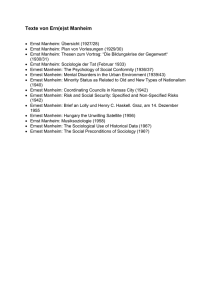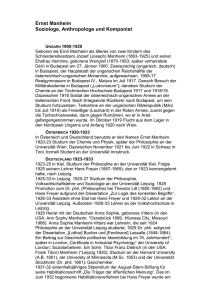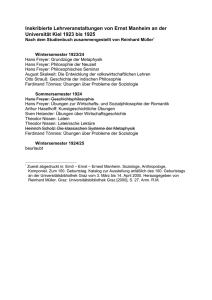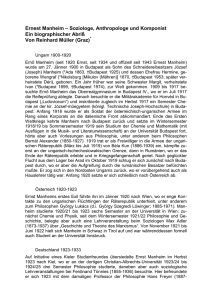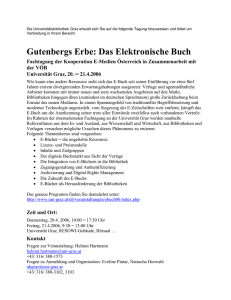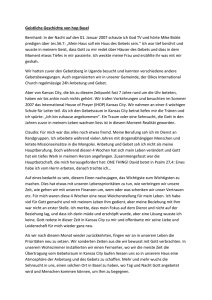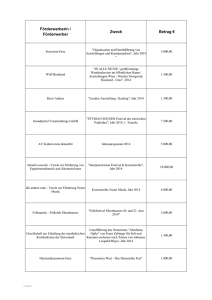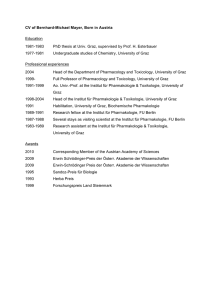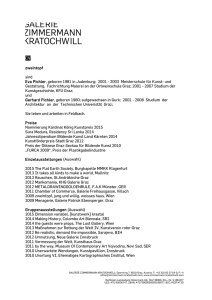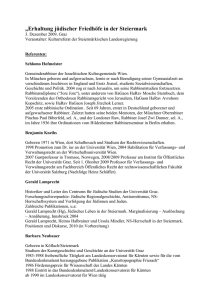Brief von Ernest Manheim an das befreundete Ehepaar Lolly und
Werbung
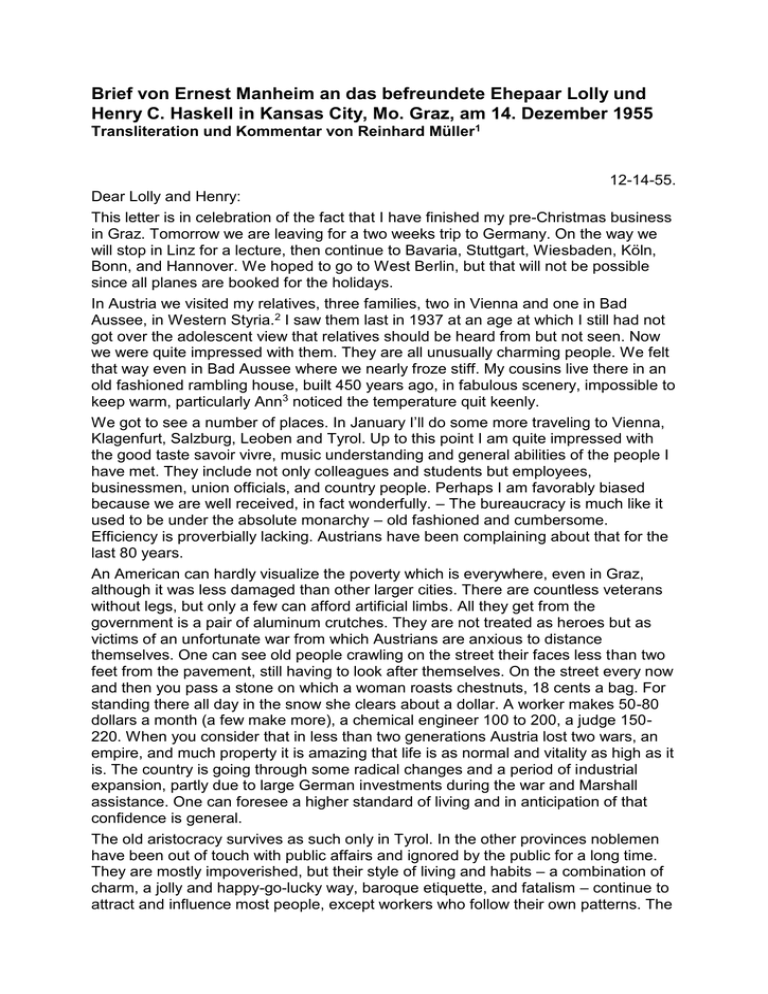
Brief von Ernest Manheim an das befreundete Ehepaar Lolly und Henry C. Haskell in Kansas City, Mo. Graz, am 14. Dezember 1955 Transliteration und Kommentar von Reinhard Müller1 12-14-55. Dear Lolly and Henry: This letter is in celebration of the fact that I have finished my pre-Christmas business in Graz. Tomorrow we are leaving for a two weeks trip to Germany. On the way we will stop in Linz for a lecture, then continue to Bavaria, Stuttgart, Wiesbaden, Köln, Bonn, and Hannover. We hoped to go to West Berlin, but that will not be possible since all planes are booked for the holidays. In Austria we visited my relatives, three families, two in Vienna and one in Bad Aussee, in Western Styria.2 I saw them last in 1937 at an age at which I still had not got over the adolescent view that relatives should be heard from but not seen. Now we were quite impressed with them. They are all unusually charming people. We felt that way even in Bad Aussee where we nearly froze stiff. My cousins live there in an old fashioned rambling house, built 450 years ago, in fabulous scenery, impossible to keep warm, particularly Ann3 noticed the temperature quit keenly. We got to see a number of places. In January I’ll do some more traveling to Vienna, Klagenfurt, Salzburg, Leoben and Tyrol. Up to this point I am quite impressed with the good taste savoir vivre, music understanding and general abilities of the people I have met. They include not only colleagues and students but employees, businessmen, union officials, and country people. Perhaps I am favorably biased because we are well received, in fact wonderfully. – The bureaucracy is much like it used to be under the absolute monarchy – old fashioned and cumbersome. Efficiency is proverbially lacking. Austrians have been complaining about that for the last 80 years. An American can hardly visualize the poverty which is everywhere, even in Graz, although it was less damaged than other larger cities. There are countless veterans without legs, but only a few can afford artificial limbs. All they get from the government is a pair of aluminum crutches. They are not treated as heroes but as victims of an unfortunate war from which Austrians are anxious to distance themselves. One can see old people crawling on the street their faces less than two feet from the pavement, still having to look after themselves. On the street every now and then you pass a stone on which a woman roasts chestnuts, 18 cents a bag. For standing there all day in the snow she clears about a dollar. A worker makes 50-80 dollars a month (a few make more), a chemical engineer 100 to 200, a judge 150220. When you consider that in less than two generations Austria lost two wars, an empire, and much property it is amazing that life is as normal and vitality as high as it is. The country is going through some radical changes and a period of industrial expansion, partly due to large German investments during the war and Marshall assistance. One can foresee a higher standard of living and in anticipation of that confidence is general. The old aristocracy survives as such only in Tyrol. In the other provinces noblemen have been out of touch with public affairs and ignored by the public for a long time. They are mostly impoverished, but their style of living and habits – a combination of charm, a jolly and happy-go-lucky way, baroque etiquette, and fatalism – continue to attract and influence most people, except workers who follow their own patterns. The former palaces which stud the city now house public offices and some business establishments. My cousin’s daughter is a pretty actress who married one of the impoverished renaissance counts (a great-grandson of Kaiser Franz Joseph).4 His family used to be located in Graz and Tyrol. They sold their residence here, at the outskirts of Graz, to the government 17 years ago.5 It is a renaissance castle of 1515, built on a slope on a big scale. It took us an hour and a half to go through one floor, then we quit. The middle classes now try to find themselves but have not yet evolved their own ways. Puritanism has never touched this country, so that what discipline and selfrestraint there is stems from direct necessity but not from a cultivated ideal. – The workers, nearly all organized, date their country back to 1918 and no further. Strangely, they have some of the characteristics of the American middle classes: thrift, respect for success, and optimism. The former class resentment is practically gone, partly because the workers have never been so prosperous as now. The Labor Party (“Socialdemocratic Party”)6 is no longer a political outsider. It has dropped its anti-religious and Marxian views, in fact it has become the nationalist party of Austria – if that term is used with caution, for nationalism has never been, and still is not, an Austrian trait. Without the active resistance of the Labor Party against the Russian attempt to infiltrate the government, no doubt, Austria would be now a part of the Russian empire. In turn, the governing conservative party (“Volkspartei”) too has become resilient and more social minded. The two parties now resemble the English Conservative-Labor combination, although the social climate is becoming more like that of Switzerland. The communists muster around 5% of the votes, and their influence is declining.7 As I am writing to you, I do not know whether we will be on our way to the States on February 7, or still in Austria to stay for another term.8 Both the Austrians and people of our Embassy asked me to stay here, or rather in Vienna, for the second semester. After much hesitation (due to our debts and the work which is waiting for me) I said yes if McGrath9 will extend my sabbatical leave. They wrote him to that effect and I followed up their letter with mine. I will not be here in Graz when the reply arrives. I am glad, in a way, at least I will not have to look ahead until New Year. I have been quite busy during the past four weeks. I talked in various places and lectured in learned societies. My students too keep me on my toes; they are alert and mostly mature people. Several have Ph.D.’s, one has two, another is a colleague.10 You will understand that my promise to write was not an excuse and I certainly hope that you, Lolly, will take your sneering remark about it back. Frank11 must have visited you by now. According to his letter he must have a hard time to decide what to do. He has some tempting offers including a job at M.I.T.12 Let us know what is new on Holmes Street. Thank you for the editorial on the postGeneva situation. I feel very much the same way, even though my American news supply is badly deficient. We wish you all happy holidays and wish we could be there for a drink with you. Yours always, Ernest. On our way back we will visit a Tyrolian peasant not too far from Brixlegg, in a village. He carves very attractive creches on order. We have seen one in a colleague’s house and hope to get one similar for you. 1 Das Original dieses Briefes befindet sich im Archiv für die Geschichte der Soziologie in Österreich, Graz, Nachlass Ernest Manheim, Signatur 31/1. Zuerst abgedruckt in: Archiv für die Geschichte der Soziologie in Österreich. Newsletter (Graz), Nr. 13 (Juni 1996), S. 7-8. Brief anlässlich seiner Fulbright-Professur an den Universitäten Graz und Wien 1955/56 an das mit der Familie Manheim eng befreundete Ehepaar Lolly und Henry C. Haskell (*Kansas City, Mo. 1902, †Kansas City, Mo. 1981), letzterer der Sohn des Zeitungsherausgebers Henry J(oseph) Haskell (*1874, †Kansas City, Mo. 1952), der das Geld für den Henry Haskell Chair of Sociology für Ernest Manheim stiftete. Anm. R.M. 2 Bad Aussee liegt im Nord-Westen der Steiermark, in der sogenannten Obersteiermark. Hier besuchte er die Familie Welzig, mit der Ernest Manheim mütterlicherseits verwandt war. Anm. R.M. 3 Gemeint ist Manheims Ehefrau Anna Sophie (später: Ann Sophy) Manheim, geborene Vitters (*Osnabrück 1900, †Kansas City, Mo. 1988). Anm. R.M. 4 Gemeint ist die Theater- und Filmschauspielerin Senta Wengraf (*Wien 1927), die 1954 ein Mitglied des steirischen Adelsgeschlechts von Herberstein, Christoph Herberstein, heiratete, von dem sie 1963 geschieden wurde. Anm. R.M. 5 Gemeint ist Schloss Eggenberg in Graz, das seit 1717 den Grafen von Herberstein als Wohnsitz diente und 1939 an das Land Steiermark verkauft wurde. Das Schloss, das auf einen mittelalterlichen Wehrbau zurückgeht, wurde in der ersten Hälfte des 17. Jahrhunderts zu einem Repräsentationsschloss umgebaut. Anm. R.M. 6 Korrekt müsste es „Sozialistische Partei Österreichs“ heißen, denn die Umbenennung in „Sozialdemokratische Partei Österreichs“ erfolgte erst 1991. Anm. R.M. 7 1953 hatte die Kommunistische Partei Österreichs mit 228.159 Wählern oder 5,3% ihren höchsten Wähleranteil in Österreich erreicht. Anm. R.M. 8 Ernest Manheim blieb noch ein weiteres Semester in Österreich, diesmal aber an der Universität Wien. Anm. R.M. 9 Earl James McGrath (*Buffalo, N.Y. 1902, †New York? 1993) war 1953 bis 1956 President (Rektor) der University of Kansas City in Kansas City, Mo. Zum Problem der Dienstfreistellung und zu den Bezahlungsmodalitäten vgl. auch die Briefe von Ernest Manheim an Earl J. McGrath im Nachlass Ernest Manheim, Signatur 31/1. Anm. R.M. 10 Gemeint ist der Soziologe und Rechtsphilosoph DDDr. Johann Mokre (*Bruck an der Mur 1901, †Graz 1981), der selbst 1939 bis 1948 in den USA als Emigrant weilte. Mokre, der 1951 die „Landesgruppe Steiermark“ der „Österreichischen Gesellschaft für Soziologie“ ins Leben gerufen hatte, gründete 1958 das Institut für Empirische Soziologie und Statistik an der Universität Graz, aus dem 1965 das heutige Institut für Soziologie hervorging. Anm. R.M. 11 Gemeint ist sein Sohn Tibor (Frank Tibor) Manheim (*Leipzig 1930), Geochemiker. Anm. R.M. 12 Massachusetts Institute of Technology in Cambridge, Mass. Anm. R.M.

